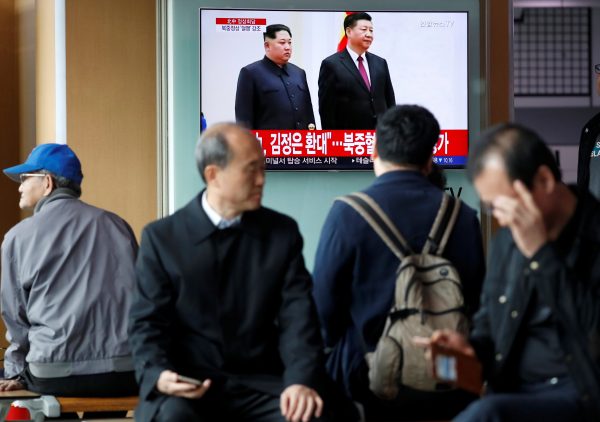While no longer the proverbial ‘lips and teeth’, the relationship between China and North Korea remains strong — albeit complex and not always harmonious. As the Korean War illustrated, North Korea is a vital national interest for China in strategic, economic and even social terms. For North Korea, the value of its relationship with China is almost immeasurable. Not only for the obvious strategic and ideological reasons, but also for the oil and gas as well as food supplies that it depends substantially on China for. Ninety per cent of North Korea’s trade is with China.
The significant ethnic Korean population inside China and the possible threat of a massive refugee inflow from North Korea reinforce China’s concerns about developments across the border.
Xi was aware that the increasingly intemperate rhetoric between Trump and Kim through 2017 and early 2018 raised the likelihood of military confrontation that could escalate to the nuclear level, with all the attendant threat not only to North Korea but also to China. In no small way, Xi’s personal involvement with Trump and Kim helped to de-escalate their rhetoric, both eventually agreeing to the Singapore summit. Kim also went to Beijing to clear his lines with Xi before going to Singapore.
That Xi was able to play such a role is no mean feat given the extraordinary tensions that prevail in the US–China relationship, especially over tariffs. However reluctantly, China came to accept the argument for stronger UN sanctions to force Kim’s hand on denuclearisation. But, like many others, China considers that the ‘agreements’ Trump and Kim announced in Singapore left so much to be done. China recognises that the ‘complete irreversible verifiable denuclearisation’ stance of the United States needs to be matched by US concessions.
Recent reports from China call for the United States and North Korea to set out a changed ‘roadmap’ for the negotiations to allow phased denuclearisation in return for US concessions. These would include reducing sanctions, International Atomic Energy Agency (IAEA) inspections and progress towards a peace treaty to provide firm security guarantees for the Korean Peninsula. Interestingly, this was echoed soon after by the South Korean Foreign Minister promoting a new ‘roadmap’ along similar lines.
Since the Singapore summit media reports suggest that China (and probably Russia) have loosened some constraints on trade with North Korea. TV footage shows long lines of semitrailers lined up on a new bridge across the southwestern China–North Korea border at Dandong and a big, ostentatious building being constructed on the North Korea side of the Yalu River directly opposite Dandong. It is claimed that this building could only be constructed with technical support and engineering materials from China — seemingly a sanctions breach.
A recent survey of available data posits that, ‘while Chinese sanctions enforcement has been relatively stringent in the era of “maximum pressure”, the PRC has sought to ensure stability and help North Korea avoid strenuous hardship by adjusting its fuel supplies according to geopolitical circumstances, among other factors’. There are also reports that China is assisting the North in its transhipment of fuel cargos at sea by allowing these to take place inside Chinese territorial waters.
Against this, some Chinese and South Korean media claim that Kim visited Xi again recently in an effort to gain stronger Chinese support for pressuring the United States to ease back on its more extreme sanctions. Kim is said to have argued that this would be a fair match for what the North had been doing to advance negotiations on its part. These media reports suggest that Xi rebuffed Kim and told him to get more serious in his negotiations with Trump.
China has several other issues that are bound to assume more importance if the second summit makes any real progress.
China has compelling reasons to become more directly involved in any destruction of the North’s nuclear infrastructure: for its own safety but also for the management of nuclear materials and waste. The bill for this would be huge and the United States will be seeking significant burden sharing (through the IAEA if need be), including possibly from China.
Although there is scarcely any public reference to North Korea’s huge weapons of mass destruction arsenal, its deactivation will pose similar problems for both China and the United States.
China will also be watching closely for discussions between Trump and Kim on foreign investment in North Korea. For many years, China and South Korea have been eyeing the future potential that the North offers for a second Korean economic miracle (albeit smaller than the first in the South). With his business cap on, Trump has seized on the same idea and is promoting it as an attraction to US business.
With the second Trump–Kim summit fast approaching, Xi’s behind-the-scenes influence will continue to be important as he keeps a close eye on China’s interests on the Korean Peninsula. As Kim is travelling to Hanoi by rail to attend the summit, he would be able to clear his lines once again with Xi in Beijing en route.
Mack Williams is a former Australian ambassador to the Philippines and South Korea.

